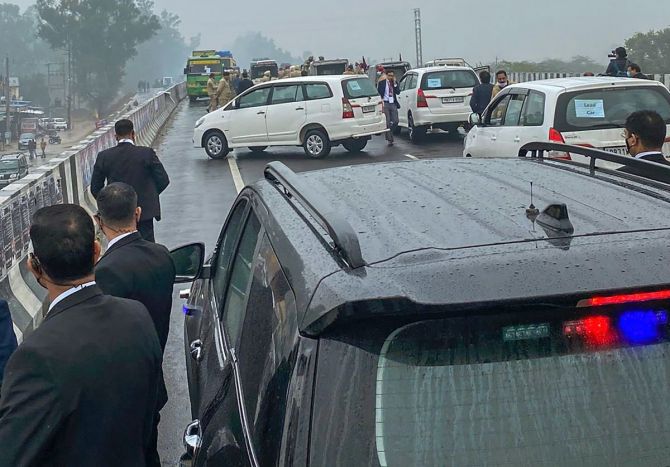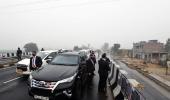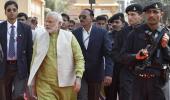'The Punjab police was taking the prime minister by road for 100 km for the first time, maybe in the last many years.'
'But the SPG keeps travelling with the prime minister every second-third day outside Delhi.'
'They are better aware of the drill; they understand the PM's security parameters better than the Punjab police.'
'They could have refused even if the clearance was given by the Punjab police.'

Avinash Mohananey, retired director general of police, Sikkim, and an ex-Intelligence Bureau officer, tells Prasanna D Zore/Rediff.com about various aspects related to the alleged lapses related to Prime Minister Narendra Damodardas Modi's visit to Punjab on January 5.
From Bhatinda airport to where Prime Minister Modi's convoy had to halt for 20 minutes on its way to Hussianiwala -- what could have gone wrong?
Nothing went wrong till he reached the flyover, where he remained stuck up for 15-20 minutes. Until that time, the movement of the PM's car-cade was smooth and fast.
The problem occurred when the Punjab police realised that some protesting farmers have gathered on the road near a village called Pyarana, which was slightly away from this flyover and blocking it.
The Punjab police was persuading the farmers to move away and clear the highway.
Did these farmers block the road all of a sudden?
It happened suddenly because in the morning all approach roads to Ferozepur district had been cleared of the protesting farmers and the movement of the traffic was smooth.
The people who wanted to participate in the rally (which was to be addressed by Modi) were being brought in by the BJP by buses and other vehicles on those roads.
Protesting farmers had moved away from these roads early in the morning before the visit on the condition that they would be given a meeting with the prime minister to raise their demands for the issues that are still pending.
This small group of farmers had gathered on the route were, in fact, on their way to Ferozepur, when they were stopped by the police. So, they squatted on the highway itself.
This was unexpected, but the Punjab police was trying to clear them up for the smooth movement of the PM's car-cade.
Couldn't this have been conveyed to the prime minister's security detail?
Yes, SPG (the Special Protection Group, which protects the prime minister of India) and Punjab police would obviously be in continuous communication, as they both were part of the same car-cade.
The entire car-cade keeps communicating with each other, so any obstacle on the route would be known to both security agencies at the same time. There were senior Punjab police and SPG officers in the car-cade itself operating in tandem.
Perhaps, the Punjab police was hoping that the farmers would move away from the road, but when it didn't clear, they had to stop the prime minister's car-cade on the flyover.
This was a huge mistake to let the prime minister remain inside the stationary car for 15 to 20 minutes -- that too on an elevated road with no escape routes.
Whose decision could it be to let the prime minister's car halt on the flyover? The SPG's or that of the Punjab police?
It must have been a combined decision and the mistake of both the SPG and the Punjab police because at that point in time they were both moving together in the car-cade.
In such situations, the security drill requires that if a PM is stuck, best plan of action would be to cancel the programme and the PM goes back. Or at least, he is taken to a nearby safe house till the road is cleared of protesters.
In the advance security liaison (ASL), safe houses along the route are identified, where the PM can be taken in such exigencies.
The ASL clearly mentions the locations of such safe houses. They could have taken the prime minister temporarily to the nearby safe house and waited for the police to clear the road of the protesting farmers. Thereafter, the car-cade could have moved smoothly.
But holding him stationary for that long was definitely a security nightmare that should have been avoided.
Who could have made the decision that the PM travel by road to Hussainiwala given that the distance is over 100 km from Bhatinda airport and takes roughly over two hours?
Could the Punjab police have had enough time to sanitise the route as the decision was made at the last moment because of bad weather?
First, road travel is always a part of contingency plan.
Contingency plans are also surveyed in advance before the prime minister's arrival as part of the ASL and certain measures are taken on the contingency route like police deployment along the route and at intersections where traffic could be stopped in case the PM decides to take that route.
This deployment is usually scanty; it doesn't involve barricading of the entire stretch. The deployment is not enough to sanitise the prime minister's route at a short notice.
Now the question is, who took the decision to move the prime minister by road? It is very difficult to find out exactly who decided the matter because there were people from the Punjab police, the SPG, and the prime minister himself. Only an inquiry can find that out.
In such situations, do the SPG or the state police decide what happens next or can a VIP in such situations over-ride the decisions of his security officers and proceed with what he wants?
It depends on the VIP. If he says 'I am moving' then the security officers have no choice but to accept it as a fait accompli and make as safe and secure an arrangement as possible in the given circumstances.
Obviously, you can't have anybody dictate to the prime minister what he must or must not do.
The security has to follow the instruction of the VIP and improvise on the situation.
Is there a precedent to this kind of decision where a prime minister travels by road for almost 100 km, and that too, in a state that borders Pakistan, and in an atmosphere as charged as it is in Punjab after the farmers' agitation against the farm laws?
I don't remember any such travel on such a long stretch. But there is no hard and fast rule that he can't be taken by road in some exigencies.
Normally, such travel (by road for such long distances) is not advisable.
The question, however, is in the first place, should Prime Minister Narendra Modi have travelled to a state to address a public meeting where farmers' anger over the passage of the three farm laws is still simmering and farmer organisations are continuing their agitation demanding minimum support price?
In fact, even before the repeal of the farm laws there have been regular protests across Punjab, Haryana, and western Uttar Pradesh, besides those on the borders of Delhi.
My point is the real administrative lapse happened at the prime minister's office. Why did the PMO make this programme despite knowing what the ground situation is like in Punjab?
They know it is a surcharged atmosphere, the people are angry in the state, their demands remain unfulfilled, and the farmers had given an advanced notice that they will hold protests (during the PM's visit).
Was it then about the prime minister's decision that he wanted to go among the angry farmers and speak about the reasons why he framed the laws and why he repealed the three farm laws?
Difficult to say who took that decision (to organise Modi's public address in Ferozepur in such a charged atmosphere), but it was an absolutely misplaced understanding of the ground situation (by the PMO).
Assuming that the decision that Prime Minister Modi would take the road to reach Hussainiwala in Ferozepur by road was taken at the last moment due to bad weather, how much time would the SPG and Punjab police need to sanitise the route to the venue and ensure that no untoward incident would take place?
I think, after landing at Bhatinda airport, the prime minister's car-cade left within an hour towards the venue.
Given that Punjab has good roads, it wouldn't have taken much time to travel the distance where his car-cade got stuck. Had there been no protesters, the event could have passed without realising the security lapses that took place.
Given the suddenness of the decision to travel by road and the security logistics involved in sanitising such a long route, do you think the SPG and Punjab police would have tried to dissuade the prime minister from taking that route given that they had less than an hour to take care of the security logistics along the route after Modi's plane landed at Bhatinda airport?
Under those circumstances, the best advice would have been to tell the prime minister to not take the road route.
It is possible that both the security agencies might have done that given the ground situation and their preparedness to make security arrangements at such a short notice.
The Supreme Court has asked the registrar general of the Punjab and Haryana high court to secure the travel records of the prime minister's visit.
What will the travel records help ascertain?
Can the findings from these travel records help pinpoint the blame and make the responsible security apparatus accountable for the lapse/s?
This will help secure all the logs of the Punjab police, the SPG, the Indian Air Force, of the PMO.
These will have details of what communication transpired between these agencies, who was talking to whom, and finally, what circumstances led to the decision to travel by road. That is very crucial.
The most important information would be of what exactly happened from the time Prime Minister Modi landed at Bhatinda airport to the time when the decision was taken to travel by road.
I hope that the enquiry will have logs of all communication that was happening between various stakeholders during that period.
What are the chances that these log details could be tampered with before these are handed over to the registrar general?
Could the agency/agencies who know they goofed up with the prime minister's security compromise these travel details before they are handed over to the registrar general?
The political slugfest between the central government and that of Punjab already shows that the issue has been highly politicised.
It is likely that both sides would hold the other side responsible for what happened that day and can selectively manipulate or tamper the information.
However, phone call records and logs with the wireless stations can't be tampered with easily. I can say with great conviction that the IAF will not manipulate their records.
So, does that leave the Punjab police and the PMO which could tamper with travel details to absolve blame or try to create a picture to paint the other party as the villain?
Nobody can say anything with certainty about such a question.
In this entire episode, where do you think did the Punjab police and the SPG/PMO failed in their duties?
There was no threat to the prime minister's life during this entire episode. Nothing of that sort happened, but it surely is a huge security lapse.
It was the Punjab police's responsibility first at Bhatinda when they gave the go ahead to let the prime minister's car-cade travel by road. Such clearances are given by the local police.
If such a clearance was given by the Punjab police, then I think there was some mistake in their understanding of the situation.
So, the prime minister's car-cade took the road route because it got the clearance from the Punjab police? Without such permission, the SPG wouldn't have started the journey?
My point though is that even if the Punjab police gave the route clearance the SPG could have overruled it.
The Punjab police was taking the prime minister by road for 100 km for the first time, maybe in the last many years. But the SPG keeps travelling with the prime minister every second-third day outside Delhi. They are better aware of the drill; they understand the PM's security parameters better than the Punjab police. They could have refused even if the clearance was given by the Punjab police.
What are the most important learnings for improving the security of India's prime minister and other VVIPs?
The most important learning is to have professional and competent people with intellectual honesty in charge of as crucial a need as the prime minister's safety and security rather than have people handpicked and chosen by the political dispensation.
There are hundreds of people who fit this bill; hand over such crucial tasks to these people and they will do it with utmost integrity and honesty.
I can say this with utmost conviction again that within the all-India services there are many who have competence, professionalism, and intellectual honesty to take proper decisions for the safety and security of the prime minister.
The saddest thing is that such officers get generally marginalised. Only the lackeys and the sycophants climb the ladder.
You should have such people who would have told the prime minister that there was no way he could be taken by the road given the situation in the state.
Do you think that Prime Minister Modi misread the situation? Wouldn't the IB have alerted the PMO about such an eventuality?
I presume the Intelligence Bureau would have given its advice, but I can't say why and how the PMO took the decision to visit the state.
I think the prime minister best knows what actually happened and why such a decision was taken.









